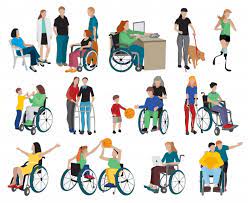Types of Disabilities

Disabilities in early childhood Despite all the best efforts at prevention, children may be born with or develop the following disabilities in early childhood, from the causes which are not yet fully understood or could be prevented.
Types of Disabilities: Visual impairment Hearing impairment Locomotor impairment; Cerebral Palsy Mental retardation and Mental illness Children with learning disabilities Dyslexia Dysgraphia Dyscalculia Attention Deficit and Hyperactivity Disorder (ADHD)
According to The Rights of Persons with Disabilities (PWD) Act, 2016, enacted on 28.12.2016 and came into force on 19.04.2017, Disability has been defined based on an evolving and dynamic concept. The Act covers the following specified disabilities:- Physical Disability Locomotor Disability Leprosy Cured Person Cerebral Palsy Dwarfism Muscular Dystrophy Acid Attack Victims Visual Impairment Blindness Low Vission Hearing Impairment Deaf Hard of Hearing Speech and Language Disability Intellectual Disability Specific Learning Disabilities Autism Spectrum Disorder Mental Behaviour (Mental Illness) Disability caused due to- Chronic Neurological Conditions such as Multiple Sclerosis Parkinson’s Disease Blood Disorder Haemophilia Thalassemia Sickle Cell Disease Multiple Disabilities
Cerebral Palsy A group of non - progressive conditions characterized by abnormal motor control posture resulting from brain insult or injuries occurring in the perinatal, neonatal, or infant period of development.
Hearing impairment Loss of sixty decibels or more in the better ear in the conversational range of frequencies.
Learning Disabilities (Dyslexia) Affect a person’s ability to acquire, process, and/or use either, spoken, read, written, or nonverbal information( organization/planning, functional literacy skills, memory, reasoning, problem-solving, perceptual skills) or in other words in short - difficulty with language in its various uses ( not always reading).
Dyspraxia - The inability to motor plan, to make an appropriate body response. Dysgraphia - Difficulty with the act of writing both in the technical as well as the expressive sense. There may also be difficulty with spelling. Dyscalculia - Difficulty with calculations. Attention Deficit and Hyperactivity Disorder(ADHD) - Hyperactivity, distractibility, and impulsivity Impairment Missing or defective body part, an amputated limb, paralysis after polio, restricted pulmonary capacity, diabetes, nearsightedness, mental retardation, limited hearing capacity, facial disfigurement, or other abnormal condition.
Disabilities As a result, an impairment may involve difficulties in walking, seeing, speaking, hearing, reading, writing, counting, lifting, or taking interest in and making one’s surroundings.
Temporary Total Disability - Period in which the affected person is totally unable to work. During this period, he may receive orthopedic, ophthalmologic, auditory, speech, or any other medical treatment. Temporary partial Disability - Period when recovery has reached the stage of improvement so that person may begin some kind of gainful occupation.
Permanent Disability - Permanent damage or loss of use of some part/parts of the body after the stage of maximum improvement [from any medical treatment] has been reached and the condition is stationary.
Handicap A disability becomes a handicap when it interferes with doing what is expected at a particular time in one’s life.
Rehabilitation Refers to a process aimed at enabling persons with disabilities to reach and maintain their optimal physical, sensory, intellectual, psychiatric, or social functional levels;
Person with Disability A person suffering from not less than forty percent of any disability as certified by a medical authority.
Institution for persons – with disabilities. An institution for the reception, care, protection, with disabilities education, training, rehabilitation, or any other service of persons